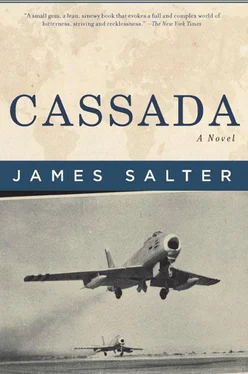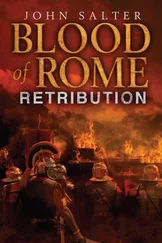“Where’s Captain Wickenden?” Dunning said.
“Everyone’s gone,” Godchaux said. “We were the only two around. Harlan went out to mobile.”
Dunning stood up. “How does it look to you out there?”
“Not too good.”
Dunning suddenly turned his head and raised a hand. “Be quiet a minute,” he said.
They looked at each other, waiting. The sound of the planes would grow from nothing. One moment, silence. The next, there it would be. Dunning’s hand, however, came down.
“You hear anything?” he asked Godchaux.
“No, sir.”
“Too soon, anyway. Where are they coming in from? Do you know?”
“There’s no flight plan. Marseilles, I guess. We just heard them go over and called the tower to find out who it was.” He looked towards the window. “I think they’re going to have a little trouble.”
“They can go to their alternate.”
“I don’t know. It’s been down everywhere all day.” He was a minister’s son. Dunning remembered when he first reported in. Wonderful, the perfect background. Can he fly on Sundays, Isbell asked? They send you these people, Dunning had said, and expect you to make something out of them. Well, they had. “Is Harlan out there yet?” he asked.
Godchaux was at the window. “I can’t see him from here,” he said.
“Get on the other extension. Ask him what they’re doing. Ask him what it looks like out there.”
The phone rang then. It was the forecaster. He had altered his observation slightly—he’d added a broken layer at three hundred feet. Dunning asked for the weather at the nearest alternates, everything within a hundred miles, and as the forecaster read them off, he scribbled them down, half-listening for the planes. Finally he stopped writing. The reports were worse and worse, the weather was no better anywhere.
“The only alternate open in Europe right now is Marseilles,” the forecaster said.
“What about England?”
“One moment, Major,” the forecaster said, his voice becoming distant as he reached for a clipboard. “I have my doubts.”
Godchaux, on the phone to mobile, could hear the radio out there. He put a hand over his receiver. “They’re on final again, Major,” he said.
“How far out? Give it here,” Dunning said, reaching. His look of self-possession was gone. In its place was nothing, the face of an officer who might still possibly be on the list to be promoted.
Just as Godchaux passed the phone they heard them, the sound low at first and then expanding, opening up, seeming to head for and almost pass over them. Dunning at the window knew what it meant. They were not landing. They had missed again and were going by, everything hanging, heavy and nose-high like a pair of sick men in the grey evening, the noise even louder when they had passed barely below the clouds, slipping in and out of them, the red tails visible, then into the clouds again and gone. The voice of the forecaster, now incidental and remote, came over the phone, “… down everywhere in England. I don’t see anything open. Major?”
At the same time there was the controller’s voice over the radio in mobile, “Fortify White, turn to three six zero…”
“Harlan!” Dunning said on the phone. “Hello!”
“Climb to twenty-five hundred feet,” the controller was directing.
“Harlan! Mobile control!”
There was the sound of the phone being picked up.
“Yeah, what is it, Billy? They screwed up another one.”
“This is Major Dunning.”
“Oh, sorry, Major. They just missed another approach. Maybe you better come out here.”
“I’m coming right out,” Dunning said. “What about the weather? How does it look out there?”
“You better come out, Major.”
“I’ll be right there.”
Godchaux was pointing to the other receiver from which the forecaster’s voice still came tinnily. “What about him?”
“Oh, hang up. Let’s go.”
The operations vehicle, a khaki-colored van, was parked outside. The engine started immediately. Dunning, in the driver’s seat, seemed huge. He struggled with the gearshift, shoving it one way then the other.
“Push down on it, Major. You have to push down on it.”
They lurched backwards. Dunning stamped on the brake and the van heaved to a stop. They started forward again, down the taxiway, picking up speed.
“Which way are you going?” Godchaux called.
“Right across.”
“It’s pretty rough out there.”
“Hold on!”
Dunning was looking towards each end of the runway as they drove, half expecting the planes to appear from anywhere. Towards the far end the clouds seemed a little higher. That might be it, to bring them in downwind, but as he looked he saw that it was shifting all the time, spaces were revealed and then covered over again.
At the intersection Dunning didn’t turn but went straight ahead, off the taxiway, jolting across the uneven ground, still watching for the planes. There was a sudden slam as he drove into a hollow, the van shot up and hit again on the front wheels. Godchaux was holding on to the seat. Dunning had the accelerator to the floor. Ahead was the mobile control with the shadow of Harlan showing through the flat glass. He opened the door as they came running towards him. Dunning pushed past and into the narrow space between the two counters on which were binoculars, frayed magazines, and a flare pistol. The radio hummed beneath.
“Where are they?” he asked.
“They’re on the downwind.”
“Have they said how much fuel they have?”
“I’m not sure. About a thousand pounds, I think.”
Dunning felt a moment of relief, not at the number but at having made it out in time, like someone who finds a piece of wreckage to cling to in a stormy sea. He looked to the north as he waited for the voices. All was calm. The sky was the cold grey of lead. It touched the hills. Three birds were standing in the middle of the empty runway, almost on the white center line. There were about twenty more minutes of daylight. The beacon had become brighter. It was skimming the base of the clouds, increasing in contrast each time around. No, he was imagining that. All was quiet, closed until morning, when the voice of the controller who was in a yellow and white checkered van at the far end of the field came up clear,
“Fortify White, turn left to one five zero and descend to two thousand feet for base leg.”
Godchaux, crowding in beside them, pulled the door closed behind him.
“Leave it open,” Dunning ordered. “I want to hear them if I can.”
“Perform final cockpit check,” the controller said. “Gear should be down and locked. Final flap setting at pilot’s discretion.”
After a moment or two came the reply,
“White has gear down and locked.”
It was a hurried voice, a little nervous and high. Dunning tried to think; they were his planes, Fortify, but the voice…
“That’s not Isbell,” he said. He turned to Harlan. “That isn’t him.”
“No, sir.”
“What’s wrong? Why isn’t he leading?”
“His radio’s out,” Harlan said.
His radio was out. He wasn’t leading. The wingman was leading. In an instant everything had changed.
On the flight line in Tripoli forty or fifty planes were parked in a long, glinting row. Behind them where the blacktop ended the ground dropped away to a broad depression where seawater was evaporated in great, shallow beds. The first rule of gunnery camp was always the same, “Don’t piss in the Salt Flats.” Facing the planes was a line of corrugated iron huts with an occasional tent or some canvas rigged on poles to provide shade. The ground crews, many of them stripped to the waist, were squatting under the wings with wrenches, dropping the external tanks. Two of the three squadrons had landed. The first yellowtails were just taxiing in. The 72nd. Another flight of them was on the break. Pilots sat on their gear in the afternoon sun, waiting for the bus to take them to their tent area.
Читать дальше












